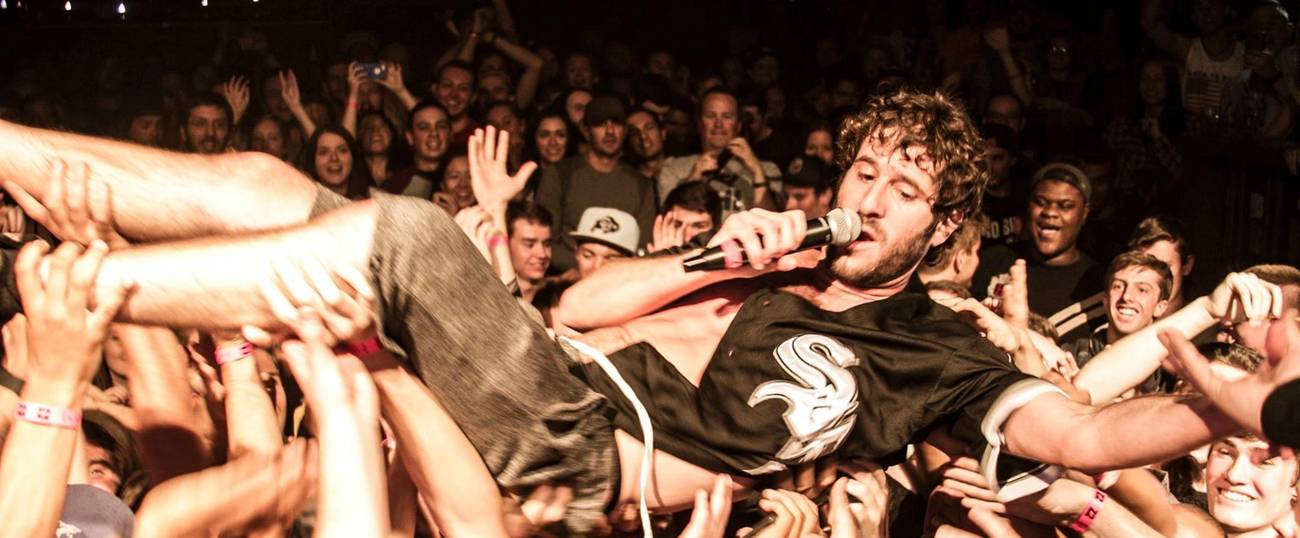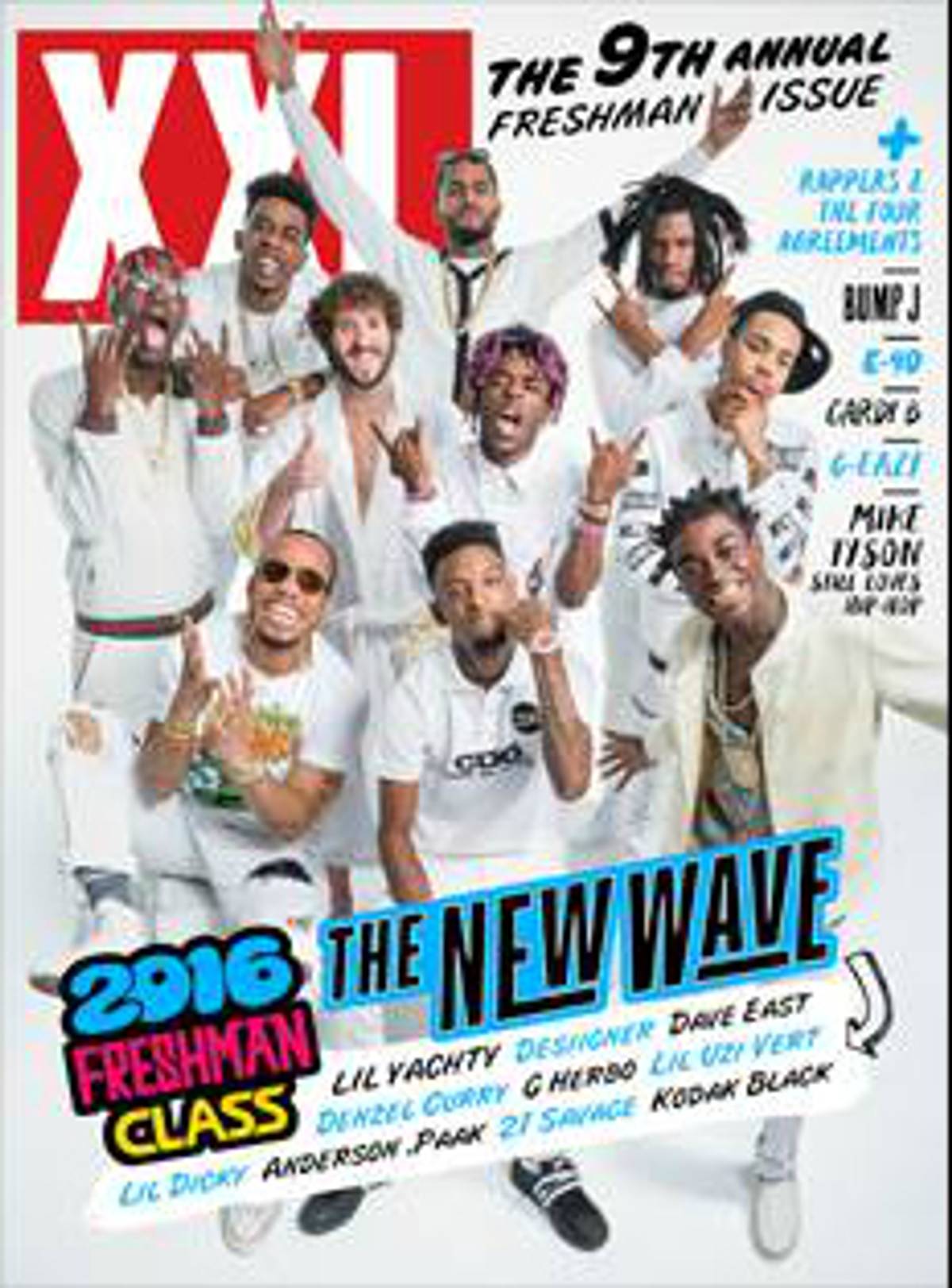The Uproarious Rise of Lil’ Dicky
How Dave Burd, a Jewish kid from the suburbs of Philadelphia, became a bona fide hip-hop star





On June 28, at the Playstation Theater in Times Square, a thousand sweaty, mosh-ready millennials puffed pre-rolled joints in anticipation of a six-act concert, featuring XXL magazine’s ninth “Freshman Class”—rap’s version of Forbes‘ annual “30 under 30”. The “Freshman Class” designation comes with significant prestige: superstars like Kendrick Lamar, Future, and Chance the Rapper are all alumni. This year’s cohort featured up-and-comers like Lil’ Dicky, Lil’ Yachty, Denzel Curry, and Kodak Black, all moderately successful rappers, as well as Desiigner, a Kanye-backed kid from Brooklyn whose hit “Panda” has become a summer anthem across the U.S.
Curry, Yachty, Dave East and G Herbo, the first acts of the night, dealt in predictable (if not boring) one-upsmanship, dampening the mood of a game crowd. But then came Lil’ Dicky, a talented rapper who grew up attending Jewish summer camps near Philly who is now—due in large part to his self-deprecating Jewish humor and envelope-pushing lyrics—on the precipice of hip-hop stardom.
During his performance, Lil’ Dicky—who also goes by Mr. Leftward Sloping Penis, The Independent Variable, The Original Pancake, Yung Dick, The Firm Handshake, and The Time Traveler’s Wife—did his thing. He rapped about farts, untimely credit card malfunctions, and striking out with women; he took blunts from the crowd; he gave a lap dance to a lucky fan; he did an elaborate chicken dance.
How did we get here? How did a nice Jewish boy from the suburbs of Philadelphia go from a YouTube sideshow to a rap star whose debut studio album, Professional Rapper, topped three Billboard charts last summer?
* * *
Lil’ Dicky’s real name is Dave Burd, a 28-year-old product of Cheltenham, Pennsylvania, a largely Jewish suburb of Philadelphia. After graduating summa cum laude from the University of Richmond—he rapped for fun in college—Burd worked as a professional in the advertising world, at one point writing copy for the NBA’s “BIG” campaign.
In 2013, Lil’ Dicky received significant Internet attention for the video for “Ex-Boyfriend,” from his mixtape So Hard. It’s a self-deprecating, filthy account of a chance run-in with a man he believes to be his girlfriend’s ex. In it, Lil’ Dicky is dismayed by the penis size of his girlfriend’s former lover. “And now I’m starin’ at this dude’s dick with a lotta hate,” he raps, “Because the shit is plus 8, Jon and Kate.”
There a few other highlights on the mixtape (“Sports” and “Stayin’ In” come to mind), but the most memorable bars are probably in “Jewish Flow,” in which Dicky battle-raps Hitler. Lil’ Dicky spits: “Sicker than the Holocaust / Dat muthafuckin’ Jewish flow / That Auschwitz sick, gas chamber kinda shit.” To some, these lyrics come across as a cynical and disgusting appropriation of the rapper’s Jewish heritage—all for cheap jokes. To others, it’s just Dicky being Dicky. Or somewhere in between. Regardless, it’s worked.
Lil’ Dicky was initially written off as a novelty by rap fans, a notoriously fickle bunch who see themselves as the gatekeepers of authenticity and good taste. He relied heavily on references to his Judaism and Philadelphia sports teams, while the perception (and perhaps the reality) was that he was more concerned with pithy couplets than substantive lyrics. Quite frankly, nobody was sure whether they should even take him seriously, but he was certainly making waves.
Then, in September 2014, NBA star Kevin Durant tweeted praise for Dicky’s ode to his then-teammate, called “Russell Westbrook On A Farm,” thereby exposing the fledgling rapper to the millions of his Twitter followers. In the song, Lil’ Dicky poignantly raps over Drake’s “Pound Cake” with an extended metaphor that tries to reconcile the purity of amateurism with call of fame and success. Spits Dicky, “My biggest problem is I can’t honestly relax / Because inside of me a damn odyssey enacts.”
Two days earlier, Lil’ Dicky had released what would end up becoming the first single for his forthcoming, Kickstarter-financed debut album. The video for “Lemme Freak,” in which Dicky tells the story of a relationship through three desperate pleas to “reward the kid” (read: get laid), currently has close to 24 million views.
In the summer of 2015, Dicky officially released Professional Rapper, with guest verses from Snoop Dogg and T-Pain. On the catchy single “$ave Dat Money,” his most popular song to-date, Rich Homie Quan and Fetty Wap lend Lil’ Dicky some credibility with their presence. The video, a meta quasi-documentary, features Lil’ Dicky going door-to-door, explaining to residents of opulent mansions and high-end car dealerships that he is attempting to make a music video for no money, part of his money-saving schtick.
“$ave Dat Money” documents Lil’ Dicky’s petty frugality, describing how he buys airplane tickets six months in advance, and how he likes “coppin’ sweaters in the summer with the sale on it.” Early on, he calls himself the “Jew Biz Major,” which is technically true, given the fact that he graduated from business school.
But his Jewish metaphors and allusions push further into unsettling territory. At the end of the song, a cup of coffee mistakenly added to his bill prompts him to say: “I’ma get on Yelp in a minute and review / This piece of shit place like only a kike know how / Unless you take the extra coffee off, I might get loud.”
Herein lies the Lil’ Dicky paradox, one that lies at the heart of his brand of Jewish humor. The balance of Lil’ Dicky’s image hinges upon a capacity to accept lazy if downright offensive Jewish stereotypes, while simultaneously appreciating a riotously funny and talented musician. Sometimes this can be a tough pill to swallow.
The excitement of seeing a young Jewish man who grew up not too far from me enjoy legitimate success in the rap game is complicated by the fact that he doesn’t do a great job actually representing his religious group in a non-stereotypical (or even original) fashion. It took me a long time to get into Lil’ Dicky for that reason precisely. His sense of humor and skill chipped away at my defenses, but I still find myself hesitant. Dick jokes I can deal with (if not celebrate); using the word “kike,” in any manner, well, now, I’m not so sure.
Take his early hit from So Hard, called “White Dude,” wherein Dicky enumerates all the advantages he has as a presumably innocuous white, Jewish man. If there was some sort of meaningful satire in that ostensibly satirical song, it’d be one thing; but instead, he smokes a joint in front of KFC with a black man and says, “Where I’m eating when I’m high / Is where they eat at to survive,” while gleefully trumpeting his ability to go on dates without fear of being sexually assault, or having a Jewish lawyer connected to his family as an escape hatch.
You’d like to chalk that up to early album, nobody’s-gonna-hear-this insouciance, but “White Crime,” from his supposedly mainstream Professional Rapper, covers the same ground. He brags about what a hardened criminal he is for bringing too much liquid on an airplane—the joke being, of course, that white people’s crimes are victimless and benign.
Dicky’s smart to use his atypical background (for rap) as a bargaining chip for potential fans–hip-hop, for the last few decades, has been as much a product of the black experience as it has been digested by white suburban males. By the same token, that doesn’t really excuse him to mock the culture that created the platform for his success. “White Crime” is a funny song if you don’t think about it at all, and as for hearing it from a rapper who’s said he wants to be “one of the greats,” you have to ask yourself if the guy in the bathrobe and goofy grin takes himself as seriously as he says he does. That’s not the Dicky that’s fun to point at and say, “Look, Jews can do anything.”
Dicky’s about to enter the mainstream—he’s got ad campaigns for Trojan, Carl’s Jr., and Madden under his belt—but only time will tell if he can establish himself as a real force to be reckoned with. Being named to XXL’s Freshman Class augurs well for him, of course, but if he wants to stay the course, there are questions he’s going to have eventually address.
Dicky ended his XXL performance by presenting a bouquet to the lucky fan he’d just finished gyrating on. Then, he asked her to refrain from pressing charges, eliciting huge laughs from the decidedly bro-heavy crowd. As he walked off the stage, now down to only his underwear, it was tough to tell if we were looking at the next great Jewish rapper or something to apologize for. The answer is probably somewhere in between.
Jesse Bernstein is a former Intern at Tablet.